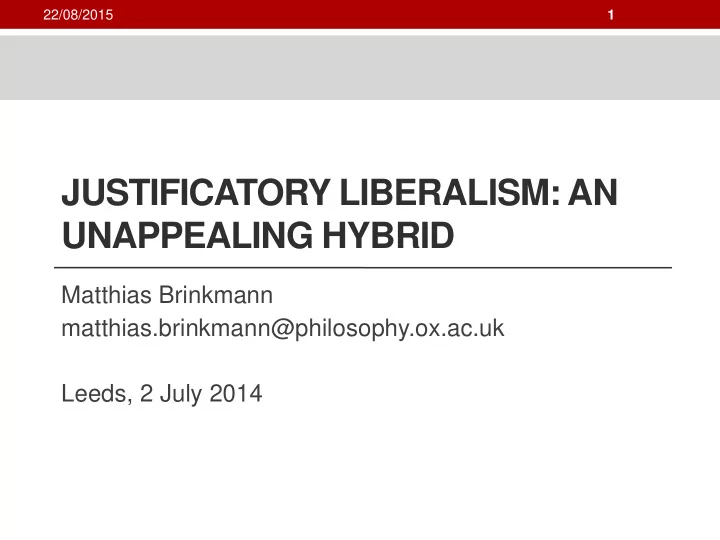

22/08/2015 1 JUSTIFICATORY LIBERALISM: AN UNAPPEALING HYBRID Matthias Brinkmann matthias.brinkmann@philosophy.ox.ac.uk Leeds, 2 July 2014
22/08/2015 2 Two Questions (1) Justificatory liberalism is intuitively appealing to many – why? (2) And is its appeal real?
22/08/2015 3 Legitimacy • Normative: right/permission to rule o claim-right: correlative with duties (to obey) o power-right: correlative with a liability o permission (to coerce) • I am interested in the right/permission to rule – this might be filled out in different ways
22/08/2015 4 RATIONALISM & VOLUNTARISM
22/08/2015 5 Two Extreme Views • Rationalism : Some agent or norm is legitimate if it provides certain objective benefits – e.g., justice • Voluntarism : Some agent or norm is legitimate if agents have willed it – e.g., consented to it • These are ideal positions, but suffice for the current purposes
22/08/2015 6 Justificatory Liberalism • Operates via a double hypothetical: Some norm is publicly justified to X iff X would consent if (1) we asked for X‘s consent, and (2) X were reasonable. • Reasonableness has moral and epistemic aspects • No matter the details, we respect the moderation or internalism constraint : what is publicly justified to X is connected to the actual beliefs and values that X has • Exampl e of the Catholic
22/08/2015 7 HYBRIDITY CLAIMS
22/08/2015 8 Structural Hybridity Claim • From voluntarism, JL takes the notion of consent, but filters it through a hypothetical • From rationalism, JL takes the notion of reason, but re- interprets it in a procedural fashion • The level of abstraction provides us with a sliding scale: o no abstraction: voluntarism o fully idealised individuals: rationalism
22/08/2015 9 Substantive Hybridity Claim • Dworkin‘s Challenge: Hypothetical contract is no form of contract at all • Justificatory liberalism is not a form of voluntarism, and it is not a form of rationalism • Rather, we think that it combines the appeal of the two in an overall desirable fashion, without being a form of it • Mule Analogy
22/08/2015 10 Appeal of Hybridity • As liberals, both voluntarism and rationalism are appealing o Individuals are the ultimate sources of authority: voluntarism o There is Reason, and society ought to be organised in the best possible way: rationalism • If we could combine the two strands, an important tension internal to liberalism would be resolved
22/08/2015 11 PROBLEM OF AUTONOMY
22/08/2015 12 Adjudicating Hybridity • Let’s split the problem of legitimacy into several subsets of problems • For each problem, let‘s ask: (1) Does voluntarism/rationalism solve this problem? How? (2) Can justificatory liberalism solve this problem in the same, or a similar, way? Does its solution retain (some of) the appeal of voluntarism‘s/rationalism‘s solution of this problem?
22/08/2015 13 Problem of Autonomy • Individuals are naturally autonomous / have “natural freedom” / have a right to moral independence • Being subject to an authority is in tension with these values • This problem is widely accepted by justificatory liberals, e.g.: “It is intuitively compelling to maintain that there is […] some moral independ-ence of each person from the wills of oth-ers, having something to do with the fact that they, too, have a will that is just as morally important as anyone else’s. This is a quasi -voluntarist constraint on authority.” (ESTLUND)
22/08/2015 14 Voluntarism’s Solution • Voluntarism’s “solution” is simple: only consent can legitimise an authority or norm • The justificatory liberal can‘t/won‘t say that. But can she say something similar?
22.08.2015 15 No Procedural Notions • Remember the first part of the hypothetical • Voluntarists can invoke procedural notions – such as authorisation – the justificatory liberal can‘t • There‘s no sense in which legitimacy is made, transferred, created, etc. in the justificatory framework
22/08/2015 16 ALIENATION
22/08/2015 17 Alienation “one might think that [public justification] approximates the legitimating force of consent by ensuring that citizens can submit to state coercion without betraying their fundamental ethical outlook . As long as [a public justification requirement] is satisfied, citizens need not see their coerced actions as alien to the evaluative scheme informing their autonomously pursued lives […].” (BIRD) • We autonomously choose our values • Legitimate authority under justificatory liberalism is sensitive to those values
22/08/2015 18 Problems with Alienation • Reconsider the example of the Catholic 1. She might be unreasonable; in that case alienation is inevitable 2. She might be unreasonable in a particular area; in that case partial alienation is inevitable 3. She might be various degrees of reasonable, such that various degrees of alienation are inevitable 4. She might be mistaken about whether state action is publicly justified to her
22/08/2015 19 More Problems 5. Even if she is not alienated, this is not the result of anything she has done. (Finding a nicely furnished hotel room – you‘re not alienated, but it‘s not a home you‘ve made for yourself.) 6 . From the Catholic‘s own perspective, her values might not present themselves as something she freely chooses 7. Even if they are, she has no relevant control over political norms
22/08/2015 20 Discussion so far • Critical Worries: o the problem of alienation has not been solved o we‘ve moved the goalposts: is the problem alienation really a problem of legitimacy? • This is not conclusive – it‘s likely that the justificationist can bite the bullet • But: the justificatory liberal does not achieve what the voluntarist achieves
22/08/2015 21 CONCLUDING REMARKS
22/08/2015 22 Conclusions • Other problems of legitimacy: problem of inequality, problem of subjection, problem of coercion, etc. • Aim: to make structurally similar arguments for each problem • Suspicion: we should be pessimistic about the possibility of hybrids; hard choices might be inevitable
22/08/2015 23 Thanks!
Recommend
More recommend